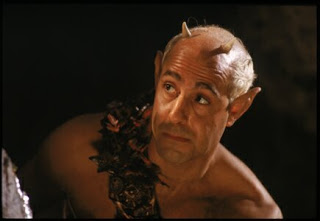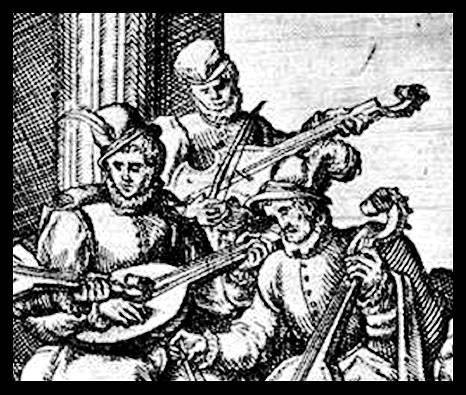About the Review
Oxford has also been touted, for the past eighty years, as the author of the poems and plays of William Shakespeare. It has become a matter of urgency to measure the real Oxford against the myth created by partisan apologists, and all too often embraced without critical rigour by the popular press.
~ Alan Nelson, Monstrous Adversary 2003
This is NOT an Oxfordian site, per se*
but a place to investigate that elusive creature, “the real Oxford”, a controversial Elizabethan subject well worth studying in his own right, with as much impartiality as we can muster.
Insofar as the earl’s life story bumps up against the towering icon of Shakespeare, our purpose here is not to promote the case for Oxford as Shakespeare, but to critique it, from an insider’s perspective. Debate is healthy. Though Nelson’s own account of Oxford’s life is marred by dislike for his subject, his challenge remains a pertinent one. Many Oxfordian myths – from the Prince Tudor fantasy of his royal birth in 1548 to the recent claims of a pre-1604 genesis for The Tempest – are even now taking root in the public imagination, and will grow more entrenched with each new publication.
Curiously, the antipathy towards Edward de Vere within mainstream academia makes a sulphuric ghost of him in studies where he might truly have a place in the narrative. Anyone searching for a scholarly assessment of his presence in the lives of Queen Elizabeth or Robert Dudley, in the works of John Lyly or Robert Green, or in the famous Harvey~Nashe quarrel, may feel a bit cheated. If mentioned at all, more often than not we’ll find him quickly dismissed with a smart slap in the next sentence. Reviews of such works will focus on integrating the historical moment or particular work under consideration with the facts of Oxford’s life.
One place where Oxford’s family history and Shakespeare’s works do seem to collide is in the early revenge tragedy, Titus Andronicus, which I believe contains many intentional parallels with the Howards, who were closely related to the de Veres through several marriages during the reign of the Tudors. Please visit Shakespeare & the Howards for introductory chapters to my book on the subject.
On the other hand, a strange repellent force seems to be at work when we look for parallels to Oxford’s life – the standard Oxfordian method of discerning authorship – within The Tempest. The savagely witty Antonio, who mocks a Burghley-inspired Gonzalo, and ineffectually plots a lame treason, is perhaps the least attractive villain in Shakespeare’s acknowledged canon, yet he does present a few discomfiting correspondences to what we know of Oxford from historical records. A work in progress, Ben Jonson & The Tempest will explore the many Jonsonian and Jacobean influences on the play, as well as its Elizabethan roots.
* Many posts dated before Sept. 24, 2013 were written from the Oxfordian perspective. However, The Edward Oxenford Review was originally conceived as a neutral sounding board for all things related to the earl’s life and times, without bias for or against his person, due to theories of authorship. After a two-years hiatus, much soul searching, and a survey of the new pro- and anti-Oxfordian websites that have sprouted since my last post in 2011, I am even more convinced of the need for non-aligned territory in cyberspace. It is my sincere hope that the next major biography of Edward de Vere will avoid the temptations of making either a devil or an angel of the man, based on the author’s conviction of who really wrote Shakespeare.
ABOUT THE EDITOR: Since first learning of the “authorship question” in April of 2000, I’ve been researching the claims made for the earl of Oxford as author of not only the plays and poems of William Shakespeare, but also the works of Robert Green, Thomas Nashe and many others.
In 2002, I was surprised to discover a clear link between Oxford’s Howard cousins and one of Shakespeare’s plays. For the next five years I worked exclusively on researching and writing Shakespeare and the Howards: A New Reading of Titus Andronicus. An expanded version of chapter 1, “Titus Andronicus and the Treasonous House of Howard” appeared in The Oxfordian, Vol. 12.
My next project explored the tempestuous relations between Ben Jonson and Shakespeare during the Poetomachia, or “Poet’s War” of 1597 – 1602, and the echoes of these times that seemed to surface in The Alchemist and The Tempest. I’ve presented two papers on this topic at the “Symposium: Shakespeare from the Oxfordian Perspective” conferences in Watertown, MA., the first resulting in an article for the Shakespeare-Oxford Society Newsletter, “Ben Jonson & The Tempest: ‘The Copie may be mistaken for the Principall'” (Sept. 2009).
My last foray into public speaking was at the annual SOS – SF conference (Ashland, 2010), where I presented a talk on some previously unnoticed intertextual curiosities involving Shakespeare’s “fruiterer” in Henry IV, Part II and a similar “fruiterer” in the 1562 anonymous Interlude, Jack Juggler.
Thanks for visiting the EO Review! Comments and questions are always welcome.
~ Marie Merkel




If anyone is interested in reviewing two books on Shakespeare’s writings and identity,
I offer Hamlet Made Simple and Other Essays and Unreading Shakespeare, both from
New English Review Press. Thanks.
Dear fellow Oxfordians, my recent report on the Chamberlain’s memorandum for Twelfth Night has been uploaded to Internet Archive for free access: https://archive.org/details/TwelfthNight3. It includes a facsimile of the 6pp document used by Hotson to write The First Night of Twelfth Night (1954); a memorandum which appears, at least in part, to be in the hand of Edward de Vere. Best of the season, Nick Drumbolis
Hi Marie,
I have no idea whether or not Jonson wrote the Masque in The Tempest. Truth to tell, it isn’t a question which interests me or has the potential so to do.
My purpose in writing, apart from saying hello to someone I still consider an old friend, is to offer my felicitations and congratulations in respect of your marvellous web site. It is, by some distance, the best-organised, most reader-friendly, easy-on-the-eye and lucid of all Oxenfordian sites.
I no longer do the Authorship Question – have long since moved on to new endeavours. Of course, as you would expect I still have an abiding obsession with the de Veres, although other projects have severely curtailed the research I’ve been able to undertake in recent years.
Are you still in the authorship mainstream – I recall seeing that you were scheduled to deliver a paper at one of the Conferences a few years back?
Every now and again I get an email from Facebook updating something or other about you (and Mark Anderson) but not being a Facebook member, and having no desire to be, their efforts seem a tad pointless. Why, this week there was even a request on LinkedIn from Roger Stritmatter, so it goes to show just how unsavvy these tech behemoths actually are – and I’m not a member of LinkedIn either.
I do hope that you are keeping well and enjoying life.
Take care,
Clive Willingham
Hello Clive,
What a lovely surprise! Thank you for the kind words about the EO Review, and your honest sentiment regarding Jonson and The Tempest Masque. It’s tiresome finding that essay always on my front page, but I haven’t had the time or inclination to write something new. And, unfortunately, the format of this WordPress package demands that the home page is always the most recent blog entry, rather than a “portal page” of introduction (such as this one, “About the Review”) with links to the various topics available onsite.
I don’t suppose we will ever see your return to the authorship arena? The SAQ is so much poorer for your absence, but I can’t say that I blame you. In essence, not much has changed, except for a lot of new faces in new venues, none of which are very edifying. Most of the chat happens on Facebook (“ShakesVere” for Oxford; “Oxfraud” against Oxford, where you’ll find our old friend Pistol). There’s some admirable wit and occasional glimpses of budding scholarship among the new players, but the sum total of hard evidence for Oxford as Shakespeare, compared to William himself as “true author” remains the same.
My last major contribution was at the Ashland Conference that you mentioned, I forget what year that was. My topic was the early, anonymous Interlude Jack Juggler. I was so delighted by this sassy little drama that I spent the better part of a year working on a new edition (never completed, alas). My paper was very well received, and even garnered an invitation to submit from the editor of Brief Chronicles (never submitted, but no alas there).
Regarding your Facebook notifications about myself (and Mark Anderson), I suspect that you may have opened an account at one time, under a cover name, or someone else used your email address to open an account under a cover name. Facebook has access to member’s email account address books, and will toss up names of people from your address book as FB friend suggestions. Years ago, I sent a “friend” request to a cover name that I thought might be you and was accepted. A year or so later, the other Mark was accepted as a friend. But the only info on this mystery person is a DOB that seems much too young for it to be you. (Surely you’re not younger than me by almost a decade??)
As for Linkedin, the same sort of solicitation by address book access happens. Except that even if you’ve never registered with them, your address will turn up on the Linkedin page of anyone with whom you’ve exchanged emails as a potential connection. Just recently, (say, in the last month) I was surprised to see your name come up as a suggested Linkedin connection. That’s probably why you got the request from Roger Stritmatter. Have you made any searches for people through Linkedin? Somehow, they’ve got you in their database.
For some reason, I’m comforted to know you’ve still got the de Vere obsession! Who else in the world knows this family’s history the way you do? For a brief, sunny moment the SAQ world benefited from your daily observations and interrogations. I will always be in your debt for teaching me how to approach our Eddie as a historian, rather than a romantic. What is too sad for me to linger on is the sudden evaporation of the Fellowship forums when the two societies merged.
My very best wishes for a congenial and stimulating fellowship in your new endeavours. What are you working on now?
Take care,
Marie
I have been interested in the authorship question for some years and would gladly recieve any news that could settle the debate once and for all. The Stratford man story is simply not believable.